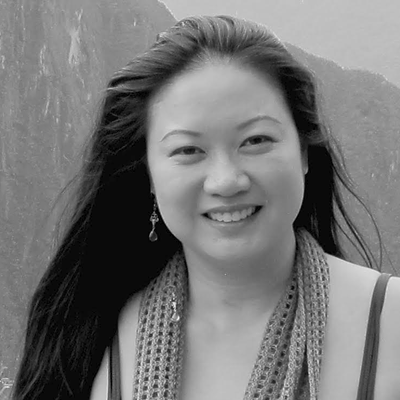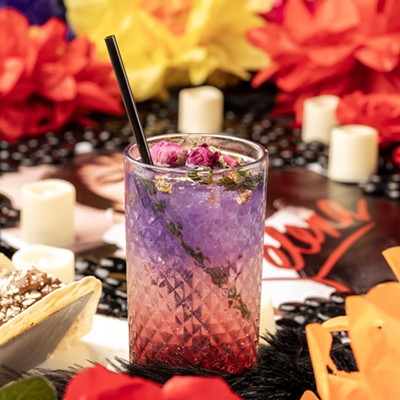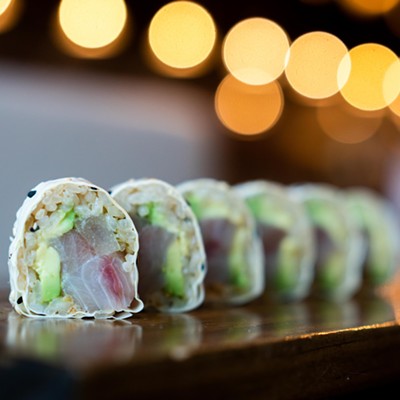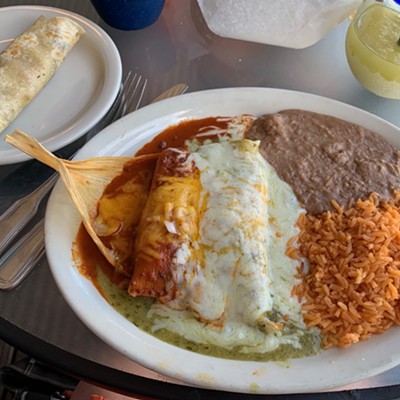Benjy Mason Down House 1801 Yale St. 713-864-3696 www.downhousehouston.com
This is the first part of a three-part chef chat series. Look for Part 2 and Part 3 in this space Thursday and Friday.
There's not always a direct route to becoming a chef. A little more than a year and a half ago, Benjy Mason, who is now Executive Chef at Down House in the Heights, was working at a local nonprofit, with no formal culinary training.
When he started staging at Feast, he recalls, "I knew how to cook. I had kitchen experience, I knew how to hold a knife, I knew how not to be an asshole and not be in the way." Approximately nine months later, he was named Executive Chef at Down House.
EOW: I know a little bit about you; I know you were at Feast before. When did you get into food?
BM: I've always really liked cooking, probably starting when I was a kid. My parents both worked, so I would make food for myself when I came home. I was obsessed with bell peppers. There was something about the smell of onions and bell peppers sautéing, so I would make a lot of onions and bell peppers and put them on everything, like beans...
EOW: Who taught you how to cook?
BM: My mom and dad taught me a few things, and then I started playing around and looking at cookbooks.
EOW: And this goes back to when you were how young?
BM: Like sixth grade, maybe.
EOW: So other people were doing sports, and you were a latchkey kid?
BM: Yeah, I was super-bad at sports. So I would go home and cook as a kid. I was a raft guide for a while, and did a lot of cooking as a raft guide -- this was when I was in Oregon.
EOW: So, you're not from Houston?
BM: No, I'm from Vermont, just south of Burlington. Everybody drives Subaru Outbacks there. It was very rural. I grew up in a small town with about 3,000 people, and I always wanted to get out. I actually left in high school and went to boarding school for a while, and then did an exchange program in China, because I was always into Chinese food.
EOW: Did they have Chinese food in rural Vermont?
BM: There was one super-Americanized Chinese restaurant. I used to go there all the time as a little kid. That was my favorite restaurant. I'd always get Szechuan beef, mooshoo pork, and the flaming pupu platter, which is when you get all the appetizers, and there's a blue Sterno flame in the middle.
EOW: So, you went to China when you were how old?
BM: So, I studied Chinese in boarding school, mostly because I was really into Chinese food, and then I went to do an exchange program when I was 15. I went to Beijing and stayed with a host family for a semester. I'll always remember the first day I got there. My Chinese host mother really wanted me to feel comfortable and at home. I woke up the first morning, and she'd made me her version of an American breakfast. But she'd only seen it in pictures, so she'd re-created it, but solely visually. So there were wok-fried eggs, fried in oil, so they were crispy and puffy -- not anything like our scrambled eggs. And then they had these things called sausages, but they were almost exactly the same as a hot dog, and they were wrapped in plastic, and there were two hot dogs on the plate to take the place of sausage. And then toast, which was really bad Chinese white bread, and then a cup of Sanka instant coffee and cup of Tang.
EOW: So, can you speak Mandarin?
BM: I used to kind of speak Mandarin. I don't remember much. When I was in college, I took more classes, and then I took a year off of college and went and traveled back to China.
EOW: Did you learn any cooking while you were there?
BM: I learned how to make dumplings. I haven't done it since then, but my host mom used to make hundreds and hundreds of jiaozi (dumplings) every Sunday night. There are a few places on the West side that make Beijing-style dumplings. Xiong's, for instance, which is in the same plaza as Arco Seafood, is the closest to what I remember.
EOW: How old are you now?
BM: I'm 31 now. I moved to Houston with a group of friends, and we started a non-profit organization called Workshop Houston, which is in 3rd Ward. They do after-school programs with middle school kids. I did that for eight years. When I started doing it, I really loved it, but when it got bigger, I wanted to move on and do something I was really passionate about, and so I started thinking about cooking again.
EOW: This was when?
BM: This was about a year and a half ago.
EOW: Wow! So you really moved quickly. So then you went to Feast, right?
BM: I was still working full-time at my other job, and I started going around to places and asking if I could stage. And a lot of people were like "Yeah sure, leave you're number and we'll call you back," and they never call you back. But Feast was like "Yeah, can you start today?" I said, "No, I can start tomorrow." So they said, "Great. Start tomorrow."
EOW: Why Feast?
BM: I had a list of places that I wanted to go to, and I always thought that what Feast was doing was really cool. And more than a lot of restaurants, I thought I could learn a lot there. And I actually went when they had New Orleans open, and it was just Richard [Knight] and Lyle [Bento] here.
EOW: What did they have you do as a stage?
BM: That's what was great, because really quickly they had me doing everything. I did a lot of butchering. I think the second day I was there, there was a pile of like 15 pigs' heads on the back table, and they were like, "Have you ever boned out a pigs' head?" And I'm like, "No! Who's ever boned out a pig head?" They were like, "Well, here's how you do it," and they showed me how to do it.
EOW: How long does it take to perfect something like that? What technique is involved?
BM: By the 15th one, you're pretty okay with it. The main thing is that you have a sharp knife, and you keep it against the bone. The only really tricky part is around the jaw, because there's muscle that goes up through the bones, but basically you're just following the bone.
EOW: What did you do with the deboned pig's head?
BM: We usually made Bath Chaps, which is a dish where you take the skin and meat off the skull, and then you take the tongue out. Then you wrap all the skin and meat around the tongue, and then you truss it. And then you brine them, and then you braise them, and then, to order, you slice them. It ends up almost being like bacon. You have a swirl of tongue and fat and meat, and then you pan-fry the slices.
Check back with us tomorrow as Mason shares details about his role as Executive Chef at Down House.
Follow Eating Our Words on Facebook and on Twitter @EatingOurWords






